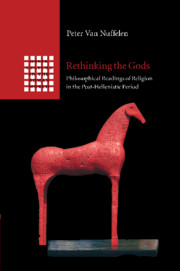Book contents
- Frontmatter
- Contents
- Acknowledgements
- Abbreviations
- Introduction
- Part I Ancient wisdom
- Part II Cosmic hierarchy
- Part III Polemic and prejudice: challenging the discourse
- Chapter 9 Lucian, Epicureanism and strategies of satire
- Chapter 10 Philo of Alexandria
- Chapter 11 Celsus and Christian superstition
- Epilogue
- Bibliography
- Index
Chapter 9 - Lucian, Epicureanism and strategies of satire
from Part III - Polemic and prejudice: challenging the discourse
Published online by Cambridge University Press: 05 December 2011
- Frontmatter
- Contents
- Acknowledgements
- Abbreviations
- Introduction
- Part I Ancient wisdom
- Part II Cosmic hierarchy
- Part III Polemic and prejudice: challenging the discourse
- Chapter 9 Lucian, Epicureanism and strategies of satire
- Chapter 10 Philo of Alexandria
- Chapter 11 Celsus and Christian superstition
- Epilogue
- Bibliography
- Index
Summary
The two discourses as reconstructed in Parts I and II of this book rely heavily on tacit, or at least rarely articulated, presuppositions, such as the primacy of antiquity and the necessity of hierarchy. Moreover, although they present themselves as uniquely plausible, they are also intricately caught up in cultural assumptions, such as polytheism and the superiority of Greek philosophy, and in political convictions, for example the preference for kingship and the justification of empire. It is only in polemical confrontations with ‘outsiders’ that such assumptions are more explicitly brought out. Each of the next three chapters focuses on texts that represent one of three such ‘outsiders’, namely Epicureans, Jews and Christians. Whilst they discuss groups that were ‘outsiders’ for very different reasons and to very different degrees, a common theme underlies all of them: the power of polemic in reshaping discourses and in testing their limits. Most of the evidence for this book has been drawn from Stoics and Platonists, with a lesser input by the Peripatos. Although the Epicureans were an established school, they were seen by the others as challenging the basic tenets of philosophy and endangering the ordered cosmos and society. More specifically, in relation to the theme of this book, I shall argue below that the Epicureans were not inclined to find truth in all forms of religion, which puts them outside the consensus of Stoics and Platonists. Seen from the perspective of the discourses on ancient wisdom and cosmic hierarchy, the Epicureans ranked as ‘outsiders’, and it is as such that they are included in the third part of this book. Jews and Christians, on the contrary, shared many of the basic presuppositions of Stoics and Platonists but they remained cultural and religious outsiders: neither group was ever integrated into Roman culture without a keen awareness of their unique history, beliefs and customs. Both turned the arguments borrowed from Graeco-Roman philosophy against its representatives to argue for the superiority of their own culture and religion. The following three chapters explore, from different angles, the polemics between, on the one hand, Platonists and Stoics, and, on the other, the Epicureans, Jews and Christians. Taken together, they illustrate the culturally embedded nature of the two discourses this book has discussed, as well as the creative force of polemic in uncovering their preconceptions. In the next chapter, I shall argue that the Jewish philosopher Philo of Alexandria (early first century ad) subtly turns the discourses on ancient wisdom and cosmic hierarchy against the Graeco-Roman culture in which they originated. Because he borrows the formal framework of the discourses but not their cultural prejudices, Philo's polemic clearly reveals the prejudicial preferences for polytheism and Graeco-Roman culture and philosophy present in them. Chapter 11 sets out how the late second-century Platonist philosopher Celsus applies to Christianity the concept of superstition as it has emerged in this book. Apart from offering a better understanding of Celsus’ arguments against Christianity by situating them in the discourse of his time, this interpretation also draws attention to the unarticulated presuppositions that drive his polemic.
- Type
- Chapter
- Information
- Rethinking the GodsPhilosophical Readings of Religion in the Post-Hellenistic Period, pp. 179 - 199Publisher: Cambridge University PressPrint publication year: 2011

